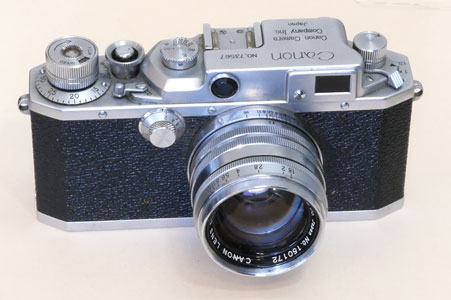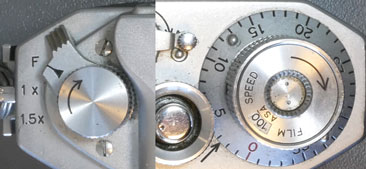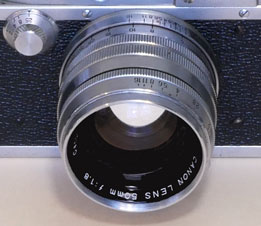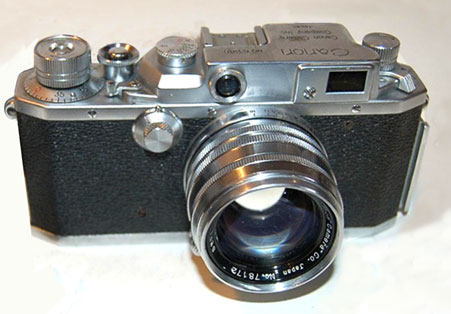Canon IIIA, IVF, IVS Rangefinder Cameras of 1952
A Description of three Canon models introduced in 1952

Canon IIIA of 1952
Introduction of Three Cameras in 1952
The new Canon introductions of 1952 were based on Canon improvements in lenses and the lens mount. The lens flange used in Canon cameras since 1946, called "semi-universal", was close but not exactly the same as the standard Leica M39 screw pitch. With the introdution of the Canon IIIA, IVF, and IVS, the lens flange screw pitch was updated to be identical with the Leica screw pitch.
Canon IIIA
First of the 1952 introductions was the Canon IIIA with primarily cosmetic changes to the model III of the previous year. As well as the improved lens flange, the switch for the rangefinder - viewfinder was changed to a more solid one-piece construction. Also, the film wind knob and rewind know were slightly changed. The film wind knob had a film speed reminder on its top, and the rewind knob was changed to match the film wind knob.

Canon IIIA new rangefinder switch, rewinder knob and film advance knob with film speed reminder
The Canon IIIA was sold with the new Canon 50mm f1.8 lens. This was a coated lens with a rigid chrome body. This lens quickly gained a reputation for high quality and resolution. It continued in production in several different versions through to the end of Canon rangefinder production.

1952 new rigid body chrome Canon 50mm f1.8 lens
Canon IVF and IVS cameras
Also introduced in 1952, the Canon IVF and IVS were updated versions of the Canon IV, with similar changes as for the Canon IIIA: a new rangefinder switch, rewinder knob and a film advance knob with film speed reminder. The new rigid chromium Canon 50mm f1-8 lens was also sold with these cameras.
The change of the Canon IVS is not evident to a user: it has a new shutter crate, which is the box surrounding the focal plane shutter mechanism. In the Canon IVS, this is one solid metal box, rather than the box assembed from sheet metal parts as was the case with the Canon IVF and previous models. So this very minor change was not evident to the user, but was given the new designation Canon IVS.

Canon IVS produced 1952-1953
1952 Canon Lenses
With the 1952 introduction of Canon cameras with the improved universal lens mount and the new rigid chrome 50mm f1.8 lens, Canon offered an extended range of high quality lenses and associated finders. These included the 35mm f3.2, the 50mm f1.8, the 50mm f1.5, the 85 mm f2.0, the 100mm f4.0 (a Canon speciality), and the 135mm f3.5, all with their associated accessory finders.
With this impressive new range of lenses, all with fine performance (except perhaps the 50mm f1.5), Canon was gaining an international reputation for offering a full system of photography for the amateur and the professional.

the 1952 range of Canon lenses
You can click on the links in the table below to consult other pages of the canonrangfinder.org site.
| Navigation: Click Below to Jump to Desired Subject Page | ||
|---|---|---|
| Canon Rangefinder Cameras - 1 | Canon Rangefinder Cameras - 2 | Canon Rangefinder Lenses |
| Canon Hansa | Canon IIAF, IIAX | Development Nikkor 50mm |
| Canon S | Canon IVSB2 | Canon 19mm |
| Canon J | Canon IIS2, IID2, IIF2 | Canon 25mm |
| Canon NS | Canon VT, Canon L2 | Canon 28mm |
| Canon JS | Canon L1, L3 | Canon 35mm |
| Canon S-I | Canon VT Deluxe | Canon 50mm |
| Canon J-II | Canon VL, VL2 | Canon 85mm |
| Canon S-II | Canon VI-L, VI-T | Canon 100mm |
| Canon IIB | Canon P | Canon 135mm |
| Canon III, IIC, IV | Canon 7 | Canon 200mm-1000mm |
| Canon IIIA, IVF, IVS | Canon 7s | Canon Accessories |
| Canon IIA, IID, IID1 | Nicca Rangefinders | Canon Finders |
| Canon IVSB | Minolta Rangefinders | Minolta Lenses |
| Canon IIF, IIS | Other Rangefinders | other M39 lenses |
| Go to canonrangefinder.com home page | ||
Any additions or corrections to these pages would be welcome simply by contacting this site as shown at the foot of this page .
Footnotes:
1 Dechert, Peter. Canon Rangefinder Cameras 1933-1968. Hove Collectors Books. West Sussex, United Kingdom. 1985. ISBN 0-906447-30-5.
Peter Dechert's book is the most important expert source of information regarding Canon Rangefinder Cameras.
2 Kitchingman, Peter. Canon M39 Rangefinder Lenses 1939-1971. A Collector's Guide. Published by Peter Kitchingman. Perth, Australia. 2008. ISBN 978-0-646-48144-9.
Peter Kitchingman's book is the definitive study of the more than three decades of M39 format camera lenses developed for Canon Rangefinder Cameras.
3 Nostalgic Canon Camera Book. 懐かしいキヤノン EI Publishing Co. Ltd. Tokyo, Japan. June 2003.
Peter Kitchingman's book is the definitive study of the more than three decades of M39 format camera lenses developed for Canon Rangefinder Cameras.
4 "Canon Camera Museum" history website. https://global.canon/en/c-museum/history/ published by Canon, Inc. accessed in 2019.
5 Rajner, Hans P. (author), John Wade (editor). Leica Copies. Classic Collections Publications. London, UK. ISBN 13: 9781874485056
Hans P. Rajner's book is an excellently detailed and carefully researched study of camera from around the world which used the Leica M39 lens mount and the same lens to film plane distance.
7 Dechert, Peter. Canon Single Lens Reflex Cameras 1959-1991. Historical Camera Publications. Yakima, Washington. 1992. ISBN 1-879561-04-2.
8 Tomlinson, Shawn M. The Film Photography Book. Lulu Pulbications. 2016. ISBN: 9781365263972
9 Sartorius., Ghester. Identifying Leica Lenses. Classic Camera 19. Tokyo, Japan. 2001. ISBN 4-257-12029-0
10 website http://www.nicovandijk.net/rflensmatrix.htm consulted 2019.
11 O'Reagan, Douglas M. Allied Exploitation of German Science after World War II. Johns Hopkins University Press. Baltimore, Maryland. 2019. ISBN 9781421428888
12 website www.canonrangefinder.servehttp.com consulted 2008.
13 Minolta expert Andrea Aprà has posted information on minoltarangefinders group and other groups and further detailed information by email. (thanks Andrea !)
14 website http://www.collection-appareils.fr/objectifs/ consulted 2019.
15 Small, Marc James. Non-Leitz Leica Thread-Mount Lenses. Wittig Books. Hückelhoven, Germany. 1997. ISBN 3-930359-47-2.
16 the Nikon Corporation website: https://imaging.nikon.com/history/ consulted 2019.
17 p 152. Ray, Sidney F. Photographic Lens ISBN 9780240510323
18 website http://www.rokkorfiles.com/Lens%20History.html accessed 2019
If you have any comments or questions about this Canon Rangefinder site, please e-mail me (Larry Huffman) at e-mail address: [email protected]